The White House is closed to tours. Smithsonian Institution museums sit empty. Businesses are losing customers. Federal workers are on standby, wondering when their next paycheck will come.
While the rest of the country focuses on national policy debates centered on affordable healthcare, people in Washington, D.C., feel the weight of the shutdown each day.
Here’s how the federal government halt is playing out on the streets of the District:
Museums everywhere – but they’re closed
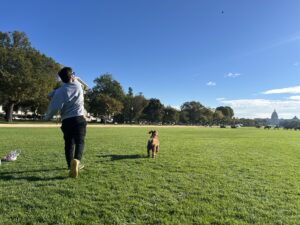
George Washington Law School student Bradley Suarez often brings his dog Maple to play fetch on the lawn of the National Mall. The Florida native said his mom tagged along a few weeks ago. It was unusually barren – no local artisans or food trucks set up outside.
Suarez said that’s not the only thing that’s changed. He had to find a new place to take study breaks, since the Smithsonian Institution museums closed.
He used to “pick one museum a day” to walk around between class work. Now, because of the shutdown, the doors are locked.
“I don’t like it,” Suarez said.
By Isabel Del Mastro
New normal
Rachel Callahan moved to D.C. two months ago, eager to start college at George Washington University and explore the city. Federal layoffs and a government shutdown welcomed her to the District.
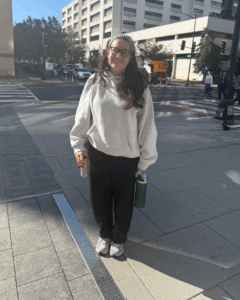
Originally from Pittsburgh, Callahan said her parents are eager to visit for family weekend. But, since TSA is “all messed up” from the shutdown, she said they may not make the trip.
As the National Guard troops walk by the Foggy Bottom Metro, Callahan said she has only known a D.C. in shutdown.
“It’s just like normal for me at this point — it would be different if I was here before,” she said.
By Ellen Tannor
Empty city, empty restaurants
Kevin Gonzales, a manager at Carvings, a casual American restaurant in Foggy Bottom, said he wonders how long the government’s pause will affect business.
“We are down to about 25% of our business’s revenue because federal employees stop coming to our establishment,” he said. The restaurant serves everything from quesadillas to Reuben sandwiches to chicken tenders.
The restaurant has been empty Wednesday, with only spurts of customers straggling in. Gonzales said the business may have to lay off morning staff if the shutdown continues.
By Lynn Howard
‘Disappointing’ trip
Rachel Jennische and Robert Muilenberg, both journalism professors at Del Mar College in Corpus Christi, Texas, flew with four undergraduate students to D.C. for MediaFest25, an annual conference for student journalists.
Jennische said she is disappointed, but not surprised, that the federal shutdown ruined their plans.
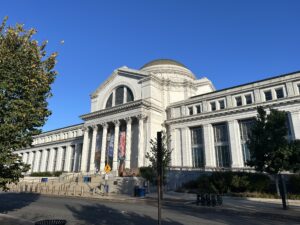
She wanted to take her students to visit the Smithsonian Institution museums, but the federal shutdown paused its funding. All 21 Smithsonian facilities closed their doors Sunday.
“I do mostly feel bad for our students because they don’t get the chance to travel much,” Jennische said. “That is disappointing.”
Instead, the group visited replicas of well-known D.C. sites, like The People’s House: A White House Experience.
By Isabel Del Mastro
No dinosaurs in D.C.
Matt, a French traveler who didn’t give his last name due to privacy concerns, is just in D.C. for two days as a part of a 60-day solo excursion throughout the United States. His trip started in New York and will end in Portland, Oregon.
He said he didn’t care about the federal shutdown at first. Then, it messed up his plans to visit the Smithsonian.
“Now, since I can’t go to see the dinosaurs, I’m kind of sad,” Matt said.
By Isabel Del Mastro
‘National gardeners’
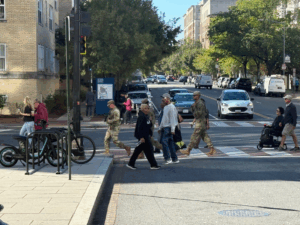
Hundreds of thousands of furloughed federal workers are going without pay during the shutdown. The military, including National Guard members, could be the next to miss paychecks.
Protesting outside Union Station, veterans Matt Gordon and Blake Heinz said the National Guard should not have been deployed in D.C.
Gordon called the deployment “an embarrassment.” The guard has no clear orders, he said, and low morale. Guards assigned to beautification of the National Mall, have earned the nickname “National Gardeners,” Gordon said.
By Terrance Williams
Future ‘to be determined’
The shutdown is making it harder for Elizabeth Riekse, a senior international relations major at American University, to finish her capstone.
She planned to write about Thomas Jefferson’s Quran. Visiting the Library of Congress was essential to Riekse’s research. Now that it’s closed, the future of her project is “to be determined,” she said.
It’s not the first time the government changes have impacted Riekse. This summer, she interned at the US Department of Agriculture. Her job was cut during DOGE.
By Anastasia Menchyk
Democracy’s future
A group called For Liberation and Resistance Everywhere, a left-wing organization protesting Donald Trump’s presidency, has been on the lawn outside Union Station for months. Randy Kindle, a board member for the organization, said Trump’s presidency is a “multi-generational traumatic event.”
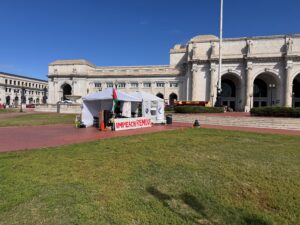
“If we don’t get Trump out by the end of the year, we won’t be a democracy for a long, long time,” he said.
Kindle said he has noticed fewer tourists since the shutdown started two weeks ago. He said he thinks Republicans and Democrats will reach a deal after the ‘No Kings’ protest Oct. 20.
By Terrance Williams
Federal workers ‘in panic’
Once a week Astor Archer stands around D.C. and spreads the word of God. He’s a Jehovah’s Witness, and said many of his friends and fellow parishioners who were furloughed are facing economic hardships.
Positioned in the heart of Foggy Bottom, across from Circa restaurant where federal workers pass by on their way to work, Archer said it seems like people are “in panic” at times.
Archer said he talks to everyone — doctors, nurses, federal workers and the general public. He looks through the pages of his bible for solutions for problems people are facing.
“It helps us see that there’s something better for mankind,” he said. “I’m here to give information, spread love and give hope.”
By Ellen Tannor
Nothing to see here
American University teaching assistant Jonah Gutterman, a 22-year-old junior from Philadelphia, usually escorts his intro-level government class on trips to federal buildings throughout the semester.
The shutdown cut those visits. “We were supposed to do a lot of really fun, exciting trips,” Gutterman said.
The class was scheduled to visit the Washington Monument and the Pentagon, he said, but the visit had to be cancelled. Gutterman said he doesn’t think the shutdown is close to ending.
“To be honest with you we haven’t covered it a whole lot in my congress class,” he said.
By Anastasia Menchyk
Life in limbo
Chris Ravenwind has been unhoused for four months. The path that led him there is tangled with the ripple effect of federal layoffs.
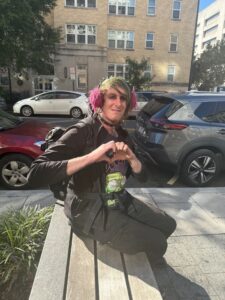
Originally from California, Ravenwind said he worked for a security company in Virginia — until he was abruptly laid off. He said he believed the layoffs were tied to the instability of the federal government.
Now, he said he spends his days submitting job applications and trying to find permanent housing, which is harder to nail down right now. Ravenwind said he is on a 5- to 8-year waiting list for government-assisted housing. For now, his next steps are simple: find food, get rest, keep trying.
“After I manage to get one responsible thing done, it’s about sleep and getting enough spare change to cope,” he said.
By Ellen Tannor
Staying optimistic

Fall is usually the busy season at Central Michel Richard, a French-American bistro near the Federal Triangle, said Ebony Miller, assistant general manager.
The restaurant’s main clientele are senators, lawyer groups and federal workers, she said.
The restaurant has seen a decrease in business since August, Miller said, but the federal shutdown has made it worse. She said her team is trying to stay optimistic.
“I’ve been trying to find creative ways just to make sure we put ourselves out there,” Miller said.
By Isabel Del Mastro
New business plan
Anuradha Mehra has sold handcrafted goods at Capital Harvest on the Plaza, a vendor market, for two years. But since the federal shutdown, she said her business has been suffering.
Mehra has 30 artisans crafting bags, scarves, and home goods in New Delhi, India, for her business IndiBlossom. She moved to D.C. 15 years ago and has been selling art for the past 10 years.
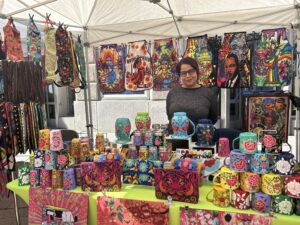
She said she only sells her goods in popup shops but, since the federal shutdown, she might create an online shop to help supplement business.
“I think in some ways I feel compelled to start my online space because, you know, with the way things are. But the shutdown is really just impacting people’s ability to shop,” said Mehra.
By Isabel Del Mastro

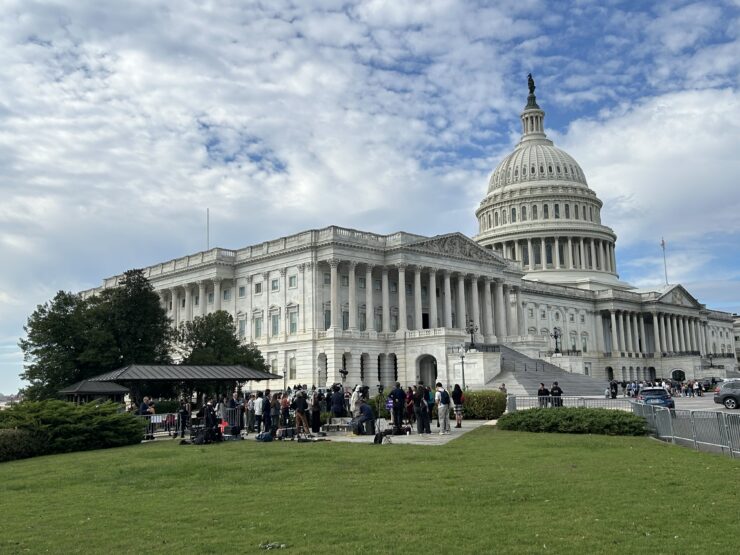













Add comment